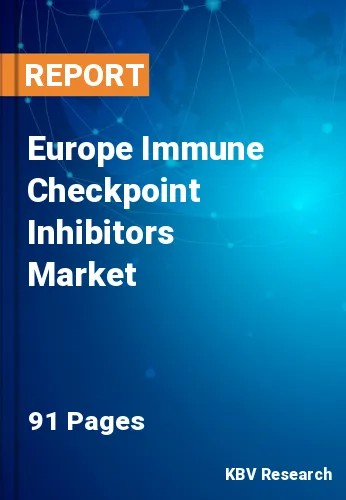The Europe Immune Checkpoint Inhibitors Market would witness market growth of 16.4% CAGR during the forecast period (2021-2027).
The immunological checkpoint is situated on the surface of T cells or tumor cells and functions to prevent T cells from becoming overactive. Under normal conditions, inhibitory checkpoint protein prevents autoimmune disease damage, but when it encounters a tumor, it prevents T cells from contacting the tumor, decreasing the immune system's ability to recognize and destroy tumor cells. The immunological reaction of T cells can be considerably activated and the anti-tumor immune impact can be re-established by utilizing ICIs.
Immunosuppressive checkpoints have been used in a vast number of studies, and the number of effective immunological checkpoints available for immunotherapy is considerable, but more specific locations are still being explored. The efficacy of ICIs is linked to the expression of biomarkers such as PD-L1 expression, tumor mutation burden (TMB), and microsatellite instability (MSI).
In the WHO European Region, breast cancer is the most frequent malignancy in women, accounting for 28% of all cases. Breast cancer mortality increased across Europe from 1950 to the late 1980s, with the exception of Norway and Sweden. Breast cancer fatalities in the Region as a whole peaked in the 1990s, reaching 14.74 deaths over 100 000 population in 1994, before declining to 13.01 deaths per 100 000 in 2009.
The International Agency for Research on Cancer (IARC) released research in the "British Medical Journal" in 2010 that found discrepancies in breast cancer death rates across 30 European countries. Mortality declined by more than 20% in 15 countries between 1989 and 2006, but stayed stable or even climbed in central Europe. Iceland has seen a 45 percent decrease, whereas Romania has seen a 17 percent increase.
The Germany market dominated the Europe Immune Checkpoint Inhibitors Market by Country 2020, and would continue to be a dominant market till 2027; thereby, achieving a market value of $4,631.8 million by 2027. The UK market is estimated to witness a CAGR of 15.5% during (2021 - 2027). Additionally, The France market would experience a CAGR of 17.2% during (2021 - 2027).
Based on Application, the market is segmented into Lung Cancer, Bladder Cancer, Melanoma, Hodgkin lymphoma, and others. Based on Type, the market is segmented into PD-1 Inhibitor, PD-L1 Inhibitor, and CTLA-4 Inhibitor. Based on countries, the market is segmented into Germany, UK, France, Russia, Spain, Italy, and Rest of Europe.
Free Valuable Insights: The Global Immune Checkpoint Inhibitors Market Size will Hit $75.9 Billion by 2027, at a CAGR of 16.1%
The market research report covers the analysis of key stake holders of the market. Key companies profiled in the report include AstraZeneca PLC, Beigene Ltd., Shanghai Junshi Biosciences Co., Ltd., Bristol Myers Squibb Company, GlaxoSmithKline PLC, Eli Lilly and Company, Merck Group (Merck Sharp & Dohme Corp.), Sanofi S.A., Merck & Co., Inc., and F. Hoffmann-La Roche Ltd.
By Application
By Type
By Country
Our team of dedicated experts can provide you with attractive expansion opportunities for your business.

